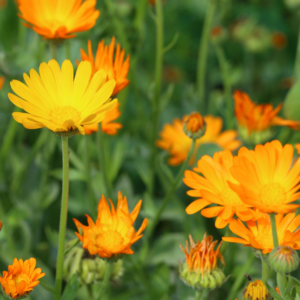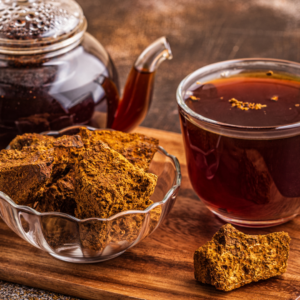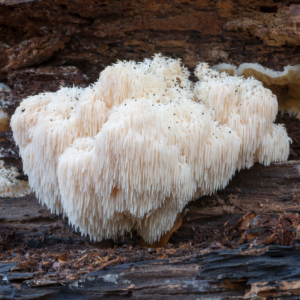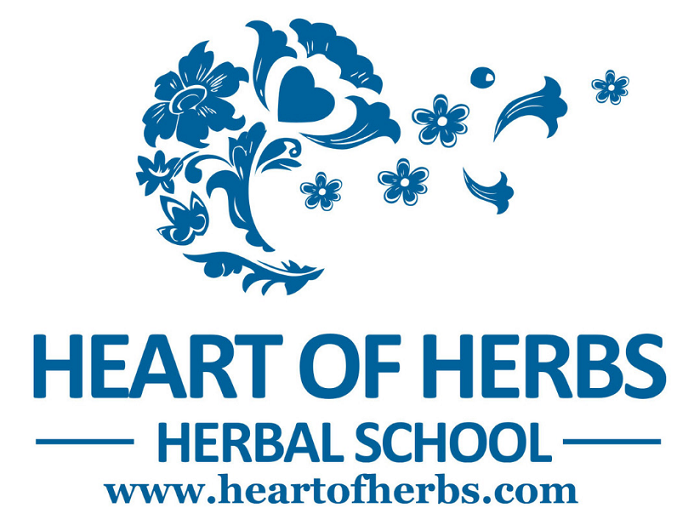Unlocking the Power of Herbal Immunostimulants: A Guide to Nature’s Defense
In natural remedies, the significance of herbal immunostimulants cannot be overstated. These botanical wonders, derived from plants and fungi, offer a potent boost to our immune system, enhancing our body’s ability to fend off illnesses and maintain optimal health. Some of the myriad options available stand out for their remarkable efficacy and versatility. Let’s delve into herbal immunostimulants, exploring their common names, scientific classifications, and the parts used while sharing a delightful herbal recipe.
Calendula (Calendula officinalis, Asteraceae)
Calendula boasts vibrant, golden flowers that are a treasure trove of immune-boosting properties. These flowers are so beautiful and fragrant.
Moreover, it is rich in flavonoids and antioxidants. Calendula stimulates the production of white blood cells, strengthening the body’s defense against infections. Utilizing the flower petals in teas or infusions can promote overall well-being and immune resilience.


Chaga (Inonotus obliquus, Hymenochaetaceae)
Chaga, emerging from the depths of birch forests, is a powerhouse of immune support. This fungus, resembling a dark, rugged mass, contains an abundance of beta-glucans and polysaccharides, renowned for their immunomodulatory effects. The versatility of Chaga allows you to incorporate it into your routine. Additionally, you can use it in teas, tinctures, or extracts, giving you the power to fortify your immune system. It also helps to and promote vitality in a way that suits you best.
Jiaogulan (Gynostemma pentaphyllum, Cucurbitaceae)
Jiaogulan, also known as ‘Southern Ginseng,’ is a highly valued adaptogen in traditional Chinese medicine. Its aboveground parts contain powerful immunostimulatory compounds such as saponins and flavonoids, which aid in maintaining immune balance and resilience. The best part is that incorporating Jiaogulan into your daily routine is as simple as brewing a cup of tea or adding it to your meals. This easy step can help improve your vitality and strengthen your immune system.

Lion’s Mane (Hericium spp., Hericiaceae)
Lion’s Mane mushroom gets its name due to its resemblance to a lion’s mane. This mushroom doesn’t just look great. Lion’s main, also offers several health benefits.
Lion’s Mane contains compounds such as beta-glucans and polysaccharides, which can help boost immune function and promote nerve regeneration. By including Lion’s Mane in your diet or taking supplements, you can strengthen your body’s natural defenses. You can even enjoy it as a tea.
aitake (Grifola frondosa, Meripilaceae)
Maitake, aptly named the “dancing mushroom” in Japanese, is in the spotlight for its immune-boosting prowess. Rich in beta-glucans and ergothioneine, It enhances immune function and helps combat oxidative stress. In addition, adding Maitake into soups, stir-fries, or teas can add a flavorful twist while strengthening your immune system.
Turkey Tail (Trametes versicolor, Polyporaceae)
Turkey Tail is a type of mushroom. It is often used in herbal medicine. It is known for its colorful bands and is considered a symbol of resilience and vitality. This mushroom is packed with polysaccharopeptides and antioxidants, which make it a great supplement for boosting the immune system and fighting off pathogens.
One of the easiest ways to incorporate Turkey Tail into your diet is by brewing it into a nourishing tea. This will help to unlock its immune-boosting potential and promote wellness from within. You can also add Turkey Tail to broths and soups for an extra immune boost.
In conclusion, Turkey Tail is a great option for those looking to support their immune system. Its numerous health benefits make it an excellent supplement to incorporate into your daily routine. So, why not give it a try and see the positive effects it can have on your overall health and well-being?
Transitioning from the exploration of these herbal immunostimulants, let’s delve into a delightful recipe that combines the goodness of several of these natural wonders:
Immune-Boosting Herbal Infusion Recipe:
Ingredients:
- 2 tablespoons dried elderflowers
- 1 tablespoon dried calendula petals
- 1 tablespoon dried jiaogulan leaves
- 1 tablespoon dried lion’s mane mushroom pieces
- 1 tablespoon dried maitake mushroom pieces
- 1 tablespoon dried turkey tail mushroom pieces
- Honey (optional, for sweetness)
- Lemon slices (optional, for flavor)
Instructions:
- Combine all the dried herbs and mushrooms in a heatproof container or teapot.
- Bring 4 cups of water to a boil, then pour it over the herbal mixture.
- Cover the container or teapot and let the infusion steep for 15-20 minutes.
- Once steeped, strain the infusion to remove the herbs and mushrooms.
- If desired, sweeten the infusion with honey and add lemon slices for extra flavor.
- Serve the immune-boosting herbal infusion hot and enjoy its nourishing benefits.
Herbal immunostimulants
This herbal infusion is a powerhouse of immune-strengthening properties. It combines the unique benefits of elderflowers, calendula, jiaogulan, lion’s mane, maitake, and turkey tail, creating a delightful and effective tonic to support your body’s defenses. Each ingredient brings its own set of immune-boosting properties, making this infusion a comprehensive solution for your health.
Herbal immunostimulants offer a natural and holistic approach to enhancing immune function and promoting overall wellness. By incorporating these botanical marvels into your daily routine, whether through teas, tinctures, or culinary creations, you can fortify your body’s natural defenses and thrive in the face of challenges. Embrace the power of nature’s pharmacy and embark on a journey towards vibrant health and vitality.
Disclaimer
Disclaimer Blog
The information presented on the Heart of Herbs Herbal School/Demetria Clark websites is for educational purposes only. Heart of Herbs Herbal School/Demetria Clark Education LLC makes neither medical claims nor intends to diagnose or treat medical conditions. Links to external sites are for informational purposes only. Heart of Herbs Herbal School/Demetria Clark neither endorses them nor is in any way responsible for their content. Readers must do their own research regarding the safety and usage of any herbs, recipes, or supplements.
Affiliate Disclosure
Some posts contain affiliate links. When you click on these and make a purchase the cost is the same for you, but we earn a small commission that helps me to provide scholarships to students. We only promote products that we know our clients have liked themselves.
Heart of Herbs Herbal School is a Amazon affiliate. As an Amazon Associate, we earn from qualifying purchases.
